|
|
|
Sort Order |
|
|
|
Items / Page
|
|
|
|
|
|
|
| Srl | Item |
| 1 |
ID:
005526
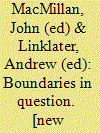

|
|
|
|
|
| Publication |
London, Pinter Pub., 1995.
|
| Description |
xv, 271p.
|
| Standard Number |
1855672650
|
|
|
|
|
|
|
|
|
|
|
|
Copies: C:2/I:0,R:0,Q:0
Circulation
| Accession# | Call# | Current Location | Status | Policy | Location |
| 036618 | 327/MAC 036618 | Main | On Shelf | General | |
| 036877 | 327/MAC 036877 | Main | On Shelf | General | |
|
|
|
|
| 2 |
ID:
080193
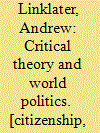

|
|
|
|
|
| Publication |
London, Routledge, 2007.
|
| Description |
viii, 240p.
|
| Standard Number |
9780415399296
|
|
|
|
|
|
|
|
|
|
|
|
Copies: C:1/I:0,R:0,Q:0
Circulation
| Accession# | Call# | Current Location | Status | Policy | Location |
| 052997 | 327.101/LIN 052997 | Main | On Shelf | General | |
|
|
|
|
| 3 |
ID:
079468
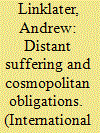

|
|
|
|
|
| Publication |
2007.
|
| Summary/Abstract |
How far does globalization extend the boundaries of community by bringing distant suffering directly into the lives of onlookers, and how far does the greater visibility of suffering arouse compassion and a willingness to help? Modern self-images that stress the growth of emotional identification between the members of the same society encourage the belief that similar attachments may develop at the level of humanity as a whole. Critics of this position emphasize deep-seated tendencies to remain indifferent to remote suffering. In the light of these differences, this paper asks whether the extension of human solidarity largely depends on the development of feelings of guilt or shame when harm is done to 'distant strangers' or when little is done to help them. It asks whether universal vulnerabilities to basic forms of mental and physical suffering create the possibility of global empathy and sympathy, and whether the idea of 'embodied cosmopolitanism' provides adequate normative foundations for collective action to reduce unnecessary suffering in distant places
|
|
|
|
|
|
|
|
|
|
|
|
|
|
|
|
| 4 |
ID:
097730
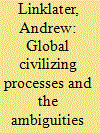

|
|
|
|
|
| Publication |
2010.
|
| Summary/Abstract |
Increased social power over the millennia has led to remarkable achievements in varied spheres of endeavour while introducing new possibilities for more destructive forms of harm over greater distances. Efforts to create moral frameworks to protect persons from senseless harm have been critical replies to the ambiguities of human interconnectedness. Over the millennia, societies have become entangled in global 'civilizing processes' such as the systems of communication that now encompass humanity as a whole, enabling different peoples to become better attuned to each other. Societies of states have immense significance for that long-term development. They have been arenas in which independent communities have discovered the prospects for, as well as the constraints on, agreements on norms that can be anchored in the most readily available points of solidarity between strangers - those vulnerabilities to mental and physical suffering that are shared by human beings everywhere. The recovery of 'universal history from a cosmopolitan point of view' can examine the contribution that international societies have made to global civilizing processes that harness such solidarities to restrain the human capacity to cause violent and non-violent harm to distant peoples. It can support the normative project of promoting global civilizing processes that employ unprecedented levels of collective power to reduce the tragic effects of the ambiguities that have accompanied long-term trends towards higher levels of human interconnectedness.
|
|
|
|
|
|
|
|
|
|
|
|
|
|
|
|
| 5 |
ID:
092042
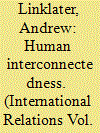

|
|
|
|
|
| Publication |
2009.
|
| Summary/Abstract |
Kenneth Waltz's structural realism abstracts the international political domain from other spheres of social interaction to explain recurrent patterns of competition and conflict across the millennia. There are similarities between the structural realist 'grand narrative' and the process-sociological approach developed by Norbert Elias. But the latter supported 'high-level synthesis' in the social sciences in order to understand how relations between material, ideational and emotional forces have contributed to the growth of human interconnectedness. The analysis contended that one of the purposes of the social sciences is to increase knowledge of how humans can gain control of the processes that bind them together in global networks of interdependence. Elias was opposed to partisan inquiry such as Kant's notion of a universal history with a cosmopolitan intent. But a shared emphasis on how humans have developed the capacity to cause distant harm reveals how future grand narratives can combine the analysis of the growth of interconnectedness with the ethical argument for greater transnational solidarity.
|
|
|
|
|
|
|
|
|
|
|
|
|
|
|
|
| 6 |
ID:
046946
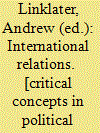

|
|
|
|
|
| Publication |
London, Routledge, 2000.
|
| Description |
2177p.
|
| Standard Number |
0415201373
|
|
|
|
|
|
|
|
|
|
|
|
Copies: C:5/I:0,R:5,Q:0
Circulation
| Accession# | Call# | Current Location | Status | Policy | Location |
| 044193 | 327.101/LIN 044193 | Main | On Shelf | Reference books | |
| 044194 | 327.101/LIN 044194 | Main | On Shelf | Reference books | |
| 044195 | 327.101/LIN 044195 | Main | On Shelf | Reference books | |
| 044196 | 327.101/LIN 044196 | Main | On Shelf | Reference books | |
| 044197 | 327.101/LIN 044197 | Main | On Shelf | Reference books | |
|
|
|
|
| 7 |
ID:
031636
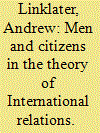

|
|
|
|
|
| Publication |
London, The Macmillan Press, 1982.
|
| Description |
xii, 232p.
|
| Standard Number |
0333320018
|
|
|
|
|
|
|
|
|
|
|
|
Copies: C:1/I:0,R:0,Q:0
Circulation
| Accession# | Call# | Current Location | Status | Policy | Location |
| 020827 | 327.101/LIN 020827 | Main | On Shelf | General | |
|
|
|
|
| 8 |
ID:
042051
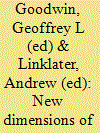

|
|
|
|
|
| Publication |
London, Croom Helm, 1975.
|
| Description |
127p.
|
| Standard Number |
0856642851
|
|
|
|
|
|
|
|
|
|
|
|
Copies: C:1/I:0,R:0,Q:0
Circulation
| Accession# | Call# | Current Location | Status | Policy | Location |
| 014979 | 327.1/GOO 014979 | Main | On Shelf | General | |
|
|
|
|
| 9 |
ID:
155157
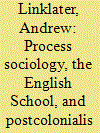

|
|
|
|
|
| Summary/Abstract |
This article responds to critics of Violence and Civilization in the Western States-Systems (Cambridge University Press, 2016). It provides a rejoinder to challenges to the attempted synthesis of process sociology and the English School analysis of international society. It rebuts the postcolonial contention that the process-sociological analysis of the impact of the European ‘civilizing process’ on the modern states-system is Eurocentric. The article explains how process sociology contributes to the postcolonial critique of ‘civilization’. It concludes by arguing that their combined strengths of the two perspectives can inform the comparative study of Western and non-Western ‘civilizing processes’ and support the development of a more ‘global IR’.
|
|
|
|
|
|
|
|
|
|
|
|
|
|
|
|
| 10 |
ID:
107564
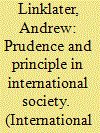

|
|
|
|
|
| Publication |
2011.
|
| Summary/Abstract |
John Vincent's Human rights and International Relations argued for embedding the right to be free from starvation in the international society of states. Principle and prudence were combined in a distinctive English School analysis of the universal human rights culture. Vincent argued that the entitlement to be free from the tyranny of starvation and malnutrition was one principle on which most societies could agree despite their profound ideological differences. Other conceptions of human rights, including western liberal doctrines of individual freedom, had the potential to create major divisions within international society, particularly when linked with a doctrine of humanitarian intervention. More recent approaches to world poverty raise large questions about whether Vincent succeeded in attempting to marry prudence in preserving an international order that remains anchored in state sovereignty with a principled commitment to ending starvation. Important issues also arise about how to build on his reflections on the prospects for a global 'civilizing process' that bridges cultural and political differences in the first universal society of states.
|
|
|
|
|
|
|
|
|
|
|
|
|
|
|
|
| 11 |
ID:
078892


|
|
|
|
|
| Publication |
2007.
|
| Summary/Abstract |
In this roundtable, four scholars talk about different aspects of the future of the discipline. The occasion for the debate on 21 July 2006, before a large audience of invited academics and students, was the opening of a purpose-built new home for the Department of International Politics at the University of Wales, Aberystwyth - the world's first such department. Below are printed edited versions of the presentations of Professor Chris Brown (Head of the Department of International Relations at LSE, and former Chair of the British International Studies Association, BISA), Professor Caroline Kennedy-Pipe (then Chair of BISA, and Professor of International Relations at the University of Sheffield), Professor Andrew Linklater (the tenth Woodrow Wilson Professor at the Department of International Politics, University of Wales, Aberystwyth), and Professor Ken Booth (former Head of Department at the University of Wales, Aberystwyth, former Chair of BISA and E. H. Carr Professor).
|
|
|
|
|
|
|
|
|
|
|
|
|
|
|
|
| 12 |
ID:
046422
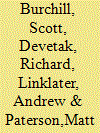

|
|
|
|
|
| Publication |
Houndmills, Palgrave, 2001.
|
| Description |
viii, 322p.
|
| Standard Number |
033391418X
|
|
|
|
|
|
|
|
|
|
|
|
Copies: C:1/I:0,R:0,Q:0
Circulation
| Accession# | Call# | Current Location | Status | Policy | Location |
| 045314 | 327.101/BUR 045314 | Main | On Shelf | General | |
|
|
|
|
| 13 |
ID:
077216
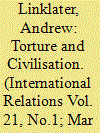

|
|
|
|
|
| Publication |
2007.
|
| Summary/Abstract |
The global anti-torture norm has been one of the main examples of a global civilising process. It refl ects modern sensibilities to cruelty and excessive force which were highlighted in Norbert Elias's account of the 'civilising process'. The idea of defending civilisation has also been used to defend torture in the war against terror. Exceptional methods are needed, it has been argued, to protect civilised ways of life. Notions of constitutional or 'civilised torture' have been introduced to try to harmonise these competing views. They have been employed in the attempt to reconcile civilised self-images with the use of excessive force. The future role of torture in the 'war against terror' depends on the interplay between these competing conceptions of the civilising process
|
|
|
|
|
|
|
|
|
|
|
|
|
|
|
|
|
|
|
|
|